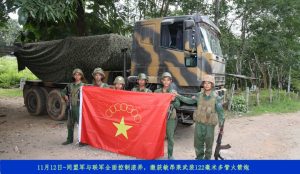Sebastian Strangio

Chinese police have issued arrest warrants for several members of a junta-aligned crime family that it believes is closely involved in online scamming operations in northeast Myanmar, as resistance forces continue to make gains across the region.
According to the CyberScamMonitor account on X (formerly Twitter), which cited warrants from the Wenzhou City Public Security Bureau in Zhejiang Province, Chinese police are seeking the arrest of a number of individuals in the Kokang Self-Administered Zone (SAZ), a sliver of territory along the Chinese border in northern Shan State.
Among them are Ming Xuecheng, a former official of the Kokang SAZ and a former member for the pro-military Union Solidarity and Development Party in the Shan State parliament. Warrants have also been issued for Ming Guoping, a brigade commander in the Kokang SAZ’s pro-junta Border Guard Force (BGF), and two other Ming family members from Zhenkang, which lies directly across the Chinese border from Kokang.
The warrants are a sign of the Chinese determination to eradicate Kokang SAZ’s destructive online scamming and “pig butchering” operations, which have trafficked thousands of people into forced servitude, as well as defrauding thousands of Chinese nationals of their savings.
These also signify in coded form Beijing’s tacit acceptance of the resistance offensive that has converged on Kokang since late October. Operation 1027, named after the date of its commencement, is being spearheaded by the Three Brotherhood Alliance, which includes the Myanmar National Democratic Alliance Army (MNDAA), the Ta’ang National Liberation Army (TNLA), and the Arakan Army (AA), has made swift gains across the region, overrunning more than 100 junta outposts, cutting trade arteries to China, and capturing at least four towns, including an important border crossing with China. The ultimate goal appears to be the capture of Kokang’s capital Laukkaing. Alliance forces are now tightening the noose on the city, prompting the junta authorities to urge Chinese nationals to evacuate the area and the Kokang SAZ leadership to initiate its own panicked raids of the city’s scam centers.
The offensive has targeted the pro-junta militias and the junta-aligned BGF that run Kokang, which the MNDAA administered until it was ousted by the Myanmar military in 2009. In a statement, the Alliance stated that its goal was to dislodge pro-regime forces across the northern part of Shan State with the ultimate goal of “eradicating the oppressive military dictatorship, a shared aspiration of the entire Myanmar populace.” Crucially, it also declared its intention to crackdown on the cyber scam operations in the Kokang SAZ, an issue that “has plagued Myanmar, particularly along the China-Myanmar border.”
As some analysts have noted recently, the Alliance’s targeting of scam operations in Kokang SAZ was adroitly tuned to China’s concerns, and its growing impatience at the military junta. In an article last week, Jason Tower of the U.S. Institute for Peace observed that for several months, Chinese officials have pressed Myanmar’s military administration to rein in the criminality taking place within the Kokang SAZ, much of which has affected Chinese nationals. But while authorities in the neighboring territory controlled by the United Wa State Army have given up hundreds of scam operators to Chinese authorities, criminal clans like the Mings were reportedly reluctant to follow suit. Nor was the junta in Naypyidaw willing to cooperate.
According to Tower’s analysis and another detailed report from the BBC, Operation 1027 was launched a week after an incident in which a number of Chinese nationals were shot during the evacuation of a prominent scam center in Laukkaing. The owner of the compound is reportedly none other than Ming Xuecheng.
The arrest warrants show the extent to which Beijing, which was once seemingly willing to turn a blind eye to criminal operations in Shan State provided that they did not directly affect its own population, has now signaled its tacit support for the removal of the Kokang SAZ’s leadership. While China has publicly called for calm and stability along the border, Alliance spokespeople told the BBC that they received no direct request from the Chinese government to stop their offensive. The arrest warrants are a further sign of China’s acceptance, if not active support, of the operation. As Tower wrote on X, they are “the strongest evidence yet that in China’s eyes the Myanmar junta has completely failed the governance test.”
The issuing of the arrest warrants has been accompanied by a number of televised confessions of Kokang-based criminals already in Chinese custody. One of these is Bi Huijun, Ming Xuechang’s son-in-law. According to a translation by the CyberScamMonitor, he said that the Kokang SAZ “can no longer engage in fraud and must stop harming the Chinese people.” “The Chinese government is determined, and the compounds must be opened and Chinese people handed back to China. If there are casualties, the Chinese government will make us pay with blood,” he added.
It is clear that China’s decision to take a hands-off approach to the offensives launched by the Three Brotherhood Alliance are crucial to its eventual success. What this signals about the broader trajectory of Myanmar’s nationwide civil war remains to be seen.
Much likely depends on the ultimate success of the operation, and whether it generates an inexorable momentum and even initiates the military junta’s terminal decline. If so, Tower wrote last week, “the pro-democracy resistance would then see a changed environment for plans to create a federal democracy, with Myanmar’s neighbors potentially more open to the possibility of cooperation with the resistance.”
No comments:
Post a Comment